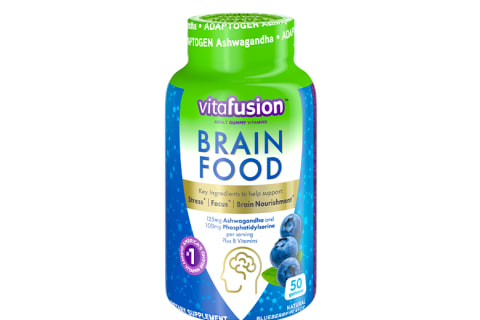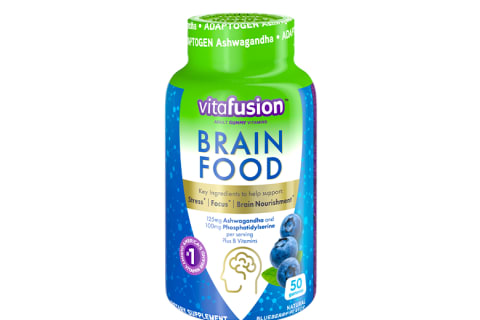Advertisement
The 3 Qualities Of A Healthy Brain, According To Science

On any given day, we traverse through an impressively diverse range of situations: cooking breakfast for our family, navigating a busy city, getting our workout in, building complex spreadsheets, solving an unexpected problem, processing big emotions like sadness and/or joy, and that’s just the beginning... We’re seldom aware of it, but all these situations are ultimately made possible by one thing: our brain.
What does it mean to have a healthy brain?
We’ve gotten serious about brain health lately, and it all started with a new addition to our wellness routine: vitafusion™ Brain Food gummies — a brain health supplement that helps nourish the brain and help support stress and focus.* Ever since, we’ve been exploring how to make brain health an actual lifestyle, starting with what “having a healthy brain” really means.
Turns out, there’s not one clear definition of brain health out there, but there are a lot of brilliant ideas on the table. One working definition by the Center For Brain Health describes, “the touchstone of brain health is a person’s ability to function well in daily life and work. This includes making wise decisions, solving problems, interacting successfully with others, and enjoying an emotional balance.” Brain health is not composed of a streamlined definition, it’s understood across areas of life. A healthy brain meets a checklist of qualities that enable our ability to function on a day-to-day basis. Here we focus on often overlooked areas such as general nourishment, focus, and stress.
Daily life and general nourishment
As they say, “life happens when you’re busy making plans.” So much of brain health is our ability to tend to the seemingly small things, the general ways we nourish ourselves like eating healthily and getting our exercise in (which add up to be quite important). This also includes the mindset and sense of purpose which keep us waking up every morning. Even if all other areas of brain health are running smoothly, humans have an intrinsic need to feel that their life has meaning… And that starts in the brain.

Stress management
These days, managing stress seems like the biggest challenge when it comes to brain health. The World Health Organization1 states that how we respond and adapt to stress and challenges can be indicative of how healthy our brain is. The reality is, there will always be problems and obstacles in life — we can’t control that. But we can control how we respond to them, and that’s a measure of brain health.

The ability to maintain focus
Focus is a hot commodity in today’s world. Distractions have become a new way of life, and research confirms it: in a professional setting, we’re interrupted every 12 minutes! Learning how to stay focused is invaluable, but it’s not as simple as resisting the temptation of our smartphone. Focus is actually a function of brain health. Experts say attention comes from two factors: enhancement, the ability to focus on what matters, and suppression, the ability to ignore what doesn’t matter. Both enhancement and suppression are functions of a healthy brain.
Ingredients for brain health
While we can assess brain health from all of these perspectives, it’s also simple: brain health allows us to function well in daily life and work. What we know now is that our brains do a lot — And that’s why vitafusion™ Brain Food is a non-negotiable part of our daily routine.
Brain Food was formulated to help nourish the brain, with its key ingredients ashwagandha, B vitamins, and phosphatidylserine.* Ashwagandha, a popular Ayurvedic herb, is a classic adaptogen that has been used for thousands of years to help with stress.* Phosphatidylserine is a fatty substance found in the body that helps nourish the brain and support focus.* Taking this supplement is a ritual that helps nourish your brain, without taking up much brain power — just one juicy gummy serving in the morning and you’re good to go.*
The bottom line: nourish your noggin’*
These days, brain health is wealth…. From menial tasks like organizing the pantry, to building complex spreadsheets, to surfing the waves of relationships. As we move forward with our brain health lifestyle, we’ll be regularly checking in on each of these categories. And staying on top of taking that tasty vitafusion™ Brain Food gummies each morning? Don’t mind if we do!*


